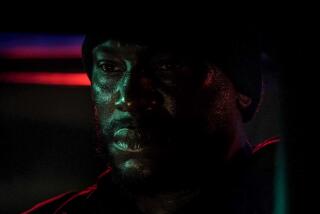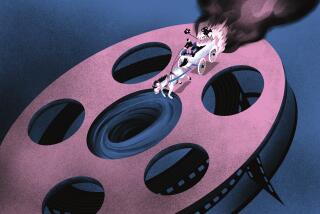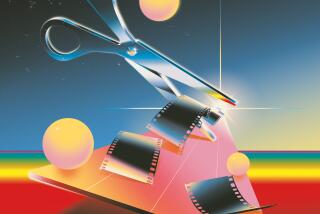‘Payback’ time for director
- Share via
AT first glance, “Payback,” a 1999 Mel Gibson neo-noir that no one has ever mistaken for a classic, hardly seems an obvious candidate for a director’s-cut special edition. But the new version, painstakingly reedited by writer-director Brian Helgeland and out this week on DVD, serves a useful comparative purpose. Seen side by side, the two “Payback” films are a case study in how ham-fisted studio interference can turn a not very good movie into a truly terrible one.
“It wasn’t like I’d created a masterpiece,” Helgeland says in one of the disc’s featurettes. True enough. Adapted from “The Hunter,” the Donald E. Westlake novel that also inspired John Boorman’s 1967 “Point Blank,” “Payback,” in either version, is unconvincing nihilist pulp. The movie follows thuggish thief Porter (Gibson, who also produced) on his tedious, bone-crunching quest to settle scores with a double-crossing ex-business partner (Gregg Henry) and reclaim the stolen cash that is now in the hands of a crime syndicate known only as the Outfit.
The Helgeland version -- also being released as part of a Gibson collection, with “We Were Soldiers” and “Braveheart” -- is at least a coherent genre exercise. The studio, presumably expecting something like a “Lethal Weapon” movie, didn’t see it that way. The cut that Helgeland submitted to Paramount, similar to the one now being released, was deemed excessively mean and violent. Asked to overhaul the film, the first-time director, whose screenwriting career was just taking off, declined. He says he was removed from the project two days after winning an adapted screenplay Oscar for “L.A. Confidential.” Gibson helped the studio reshoot and reedit the film; Helgeland retained directing credit for a movie that bore little relation to the one he’d wanted to make.
Helgeland and editor Kevin Stitt assembled the new cut the old-fashioned way, on a flatbed (they couldn’t locate the digital output tapes). Despite sharing much of the same material with the theatrical release, it looks, sounds and feels much different. There’s a new retro score with ‘70s-style horns (by Scott Stambler), the oppressive blue tint has been removed, and there’s a clipped abruptness to the frequent outbursts of violence.
Helgeland reinstates two key scenes that reportedly troubled the studio: In the first, which occurs early and essentially precludes the possibility of audience sympathy for the hero, Porter beats up his disloyal junkie wife (Deborah Kara Unger) with alarming force and even relish. In the second, he shoots someone point-blank, in cold blood.
But mostly the reedit is a process of reduction. The pared “Payback,” which shaves 10 minutes from the original running time, strips out the nonsensical third act that Gibson and Paramount had concocted to create some semblance of an upbeat ending. In that version, the plot devolves into a kidnapping caper involving the son of the crime boss, played by Kris Kristofferson. In Helgeland’s, that subplot has vanished and the head of the Outfit, never seen, takes the form of Sally Kellerman’s disembodied voice. The film climaxes not with a senseless explosion but a pleasingly brisk shoot-out.
Looking back at the 1999 “Payback,” it’s amazing to realize that every studio-mandated change, from the awkward intrusions of back story to the faux hard-boiled voice-over, compromised the film’s credibility. Most of the manipulations involved making Gibson’s character more likable, a losing proposition given the premise. The most egregious addition is the prolonged torture scene -- a Gibson trademark (see “Braveheart,” “Conspiracy Theory,” “Lethal Weapon,” “The Passion of the Christ”) -- in which Kristofferson’s character repeatedly takes a hammer to Porter’s toes.
The timing of this release is certainly ironic. Studio executives originally deemed “Payback” too much of a departure from Gibson’s leading-man heroics, and they may have been right. Needless to say, viewers may have an easier time these days accepting him as an unsympathetic figure. If Helgeland’s nastier “Payback” finds a receptive audience, it might be partly thanks to its star’s recent public-relations meltdowns.
More to Read
Only good movies
Get the Indie Focus newsletter, Mark Olsen's weekly guide to the world of cinema.
You may occasionally receive promotional content from the Los Angeles Times.










